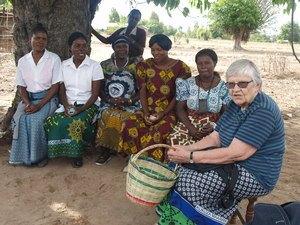Participatory Action Research as a process of sharing life
By: Marja-Liisa Swantz
Research needs to become part of people’s everyday life in order to be meaningful to them. Participatory research with action with people helps them to think through their problems and their potentialities showing the ways they can be involved beyond the immediately obvious concerns and the integration of PAR into the political process continues to be the core problem. In May of 2014, I returned from a 17-day visit to Tanzania, along with four members of the Local Government Cooperation between Hartola and Iramba District, from which now the Mkalama District has been divided.

Group Meeting in Iramba
With this trip, I continued what has become a lifetime of search for me: Participatory Action Research with the individuals who are full of ideas of how to penetrate deeper into the treasures of knowledge as part of practical life. This, for me, is inseparable from sharing life with a quest for better conditions of life for people in many parts of Tanzania. On our journey we went from Arusha to Kiomboi, visited the Beekeeping Institute at Tabora and ended our trip with three days in Dar es Salaam. These nearly 2000 kilometers of driving allowed us daily visits to villages where we followed the progress in beekeeping and honey making in Tabora, the teachings of human rights to villagers, practical subjects in post primary level, and meetings with women in their vikoba saving groups.
In Dar es Salaam we met with the ambassador and officers in the Embassy of Finland, with Principal Secretaries in two of the Government Ministries, and came together with good old friends. Maritta Virtanen from Hartola and I were accommodated by Julie Adkins, a good friend from the time in RIPS in Mtwara and Lindi regions in the 1990s, in her comfortable home in Masaki. We were able to meet Swahili professor M. M. Mulokozi, who wrote the forward of my book Blood, Milk, and Death on the Zaramo symbols.
During this trip I saw many old friends and made new ones and was excited to learn about some of the new initiatives of these friends. I had the opportunity to meet George Mwakalasya , his family, and Hambasia Maeda, a co-teacher from Ashira in the 1950s, who happened to be in Dar. She invited us to see her new abode and enterprise near Bagamoyo, in the middle of forest three miles off the main road, across the Ruvu river. She plans to extend her three acres to ten more of cultivation and add to the three big halls of chickens and three cows to make a model farm.
Selina, former student of mine, came with us to Bagamoyo, where we met Mwajuma Masaiganah and visited her fine Primary Schools she now runs in Bagamoyo. She also has started a new school in her home district in Mara. This experience confirmed my understanding that the struggles and problems of these communities require enduring research with participation of local women and men. Research can no longer be separate from the personal struggle for life and through participatory action research we can integrate the voice and work of our communities into the political processes that can directly influence the quality of life of our communities.
